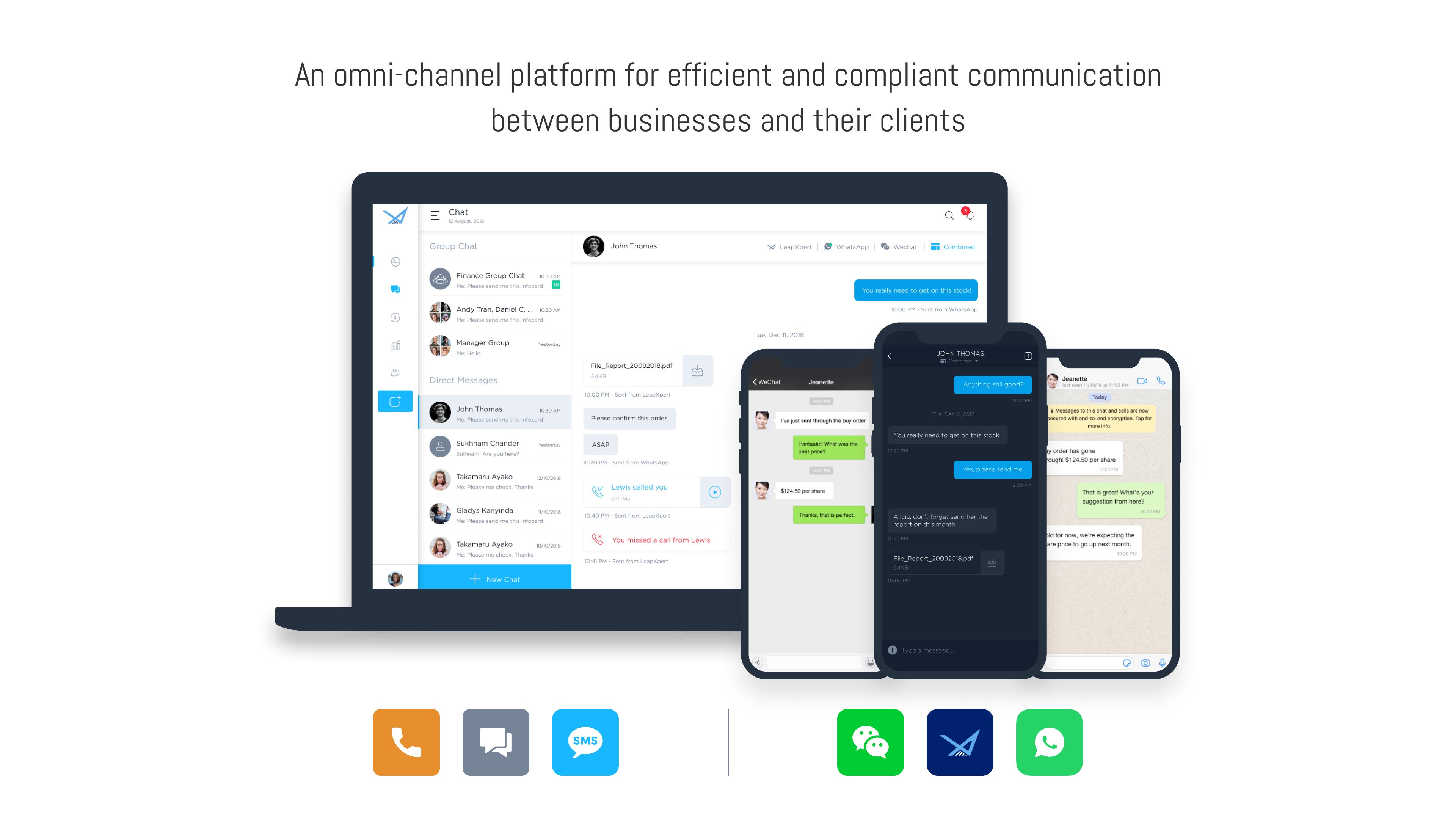The pandemic brought with it a spike in work-from-home and hybrid work, which increased peoples’ dependence on personal devices — driving businesses to try and rein in their use. It’s been a particular challenge for the financial services industry, which has comparatively strict governance and compliance requirements. In September, the U.S. Securities and Exchange Commission (SEC) fined Wall Street banks, including Bank of America and Goldman Sachs, $1.8 billion over failures in monitoring how staff used their personal phones to talk about work.
On the hunt for a solution to the chat compliance problem, three entrepreneurs — Dima Gutzeit, Avi Pardo and Rina Charles — decided to create their own, LeapXpert. LeapXpert allows employees to message customers or colleagues through popular apps, including WhatsApp, WeChat, iMessage, Telegram and Signal, while monitoring and archiving their business-related chats.
“My co-founders and I were concerned that if businesses didn’t evolve fast enough to adopt modern messaging apps and transform this growing shadow communication into approved and reliable business communication mediums, there would be major negative implications,” Gutzeit told TechCrunch in an email interview. “And so, LeapXpert was founded with a mission to help companies seize the opportunity to transform business communication.”
Staffers might find the idea of an app that records their conversations disconcerting — and rightly so. When asked about privacy, Gutzeit was open about the fact that LeapXpert can maintain “a complete record” of all conversations between a company’s employees and third parties — but added that LeapXpert itself doesn’t have access to the data.
“Just like in cases of regulatory audits, when regulators turn directly to the financial institute, law enforcement agencies may request data directly from our customers,” Gutzeit clarified. “It’s then up to our customers to decide if and how much data to pull from their archiving system and hand over to the authorities. We aren’t a party to any such transaction.”
It’s a trend, to be fair. Even before the pandemic, conversation monitoring in the workplace was becoming more common than it used to be. According to a 2019 survey by GetApp, only 10% of managers considered recording worker chats to be an invasion of privacy, while 47% admitted to monitoring conversations on a daily or weekly basis.
Unsurprisingly, workers aren’t too happy about this. In a 2022 study, Harvard Business Review found that monitoring staffers actually makes them more likely to break rules. And anecdotally, monitoring tends to lead to mission creep. Goldman Sachs once used a monitoring system to automatically flag 180 different phrases in employee communications for scrutiny by its compliance officers, including seemingly innocuous exchanges like “answer your phone,” “don’t worry I’ll take care of it” and “I don’t understand.”
But given the high stakes in the financial industry, with the SEC making it abundantly clear that it sees personal, unmonitored texts from bank employees as an impediment to investigations, employers are less likely to be dissuaded. See Deutsche Bank, which last June forced bankers to install an app called Movius that tracks communications on their phones.
“For technical decision makers, maintaining control over messaging channels used for business communication is crucial,” Gutzeit said. “To date, our unique value has been in building the pipes for better communication.”
While that’s up for debate, LeapXpert touts its worker-monitoring, “mobile-first” dashboard through which employees can sign in to and access chat channels such as SMS, iMessage, WhatsApp, Telegram, WeChat, Signal, Line and certain VoIP apps. On the employer side, companies can set rules and requirements for the types and level of materials that can be sent internally or externally, including specific keywords and phrases, and see the real-time status of all messages sent.
LeapXpert promises to avoid capturing private and personal messages by siloing communications, enabling employees to have an independent messaging profile for personal use. TechCrunch wasn’t able to test this, though, so we can’t say how well it works in practice. We also can’t say whether it’s possible for an employer to circumvent this silo — a valid fear for surveillance-wary employees.

LeapXpert’s platform acts as a gateway to popular chat channels such as WhatsApp, SMS and iMessage, running monitoring and archiving tools on top of chat sessions. Image Credits: LeapXpert
Purely from a competitive standpoint, LeapXpert faces an uphill battle. Other platforms like it exist, including Symphony, TeleMessage and VoxSmart. But Gutzeit argues that, rightly or wrongly, LeapXpert is more holistic in its data capture than most.
“We have added dozens of integrations with other tech solution providers. It has made the platform more compressive and enabled new use cases for new markets,” he said.
In any case, LeapXpert hasn’t had trouble attracting customers — or investors, for that matter. Gutzeit says that the company counts “dozens” of financial institutions among its client base as well as “dozens” of enterprises in other vertical markets that collectively have tens of thousands of users on the platform.
“Customers tell us that our product is a ‘must have’ not ‘nice to have,’” Gutzeit said. “The slowdown in the economy and in tech has not affected our business.”
To that end, LeapXpert this week closed a $22 million Series A funding round led by Rockefeller Asset Management with participation from Uncorrelated Ventures, the Partnership Fund for New York City and other undisclosed existing investors. It brings the company’s total raised to $22 million, which Gutzeit says is being put toward growing LeapXpert’s 150-person workforce, expanding into new markets and investing in product development.
With the cash infusion, LeapXpert also plans to launch a software-as-a-service version of its platform aimed at small- and medium-sized business customers. Currently, LeapXpert comes in only on-premises and self-managed cloud flavors.
“The latest round provides us an additional layer of stability and comfort during these times and enables us to maintain and even accelerate our growth trajectory.”
Credit: Source link


Comments are closed.